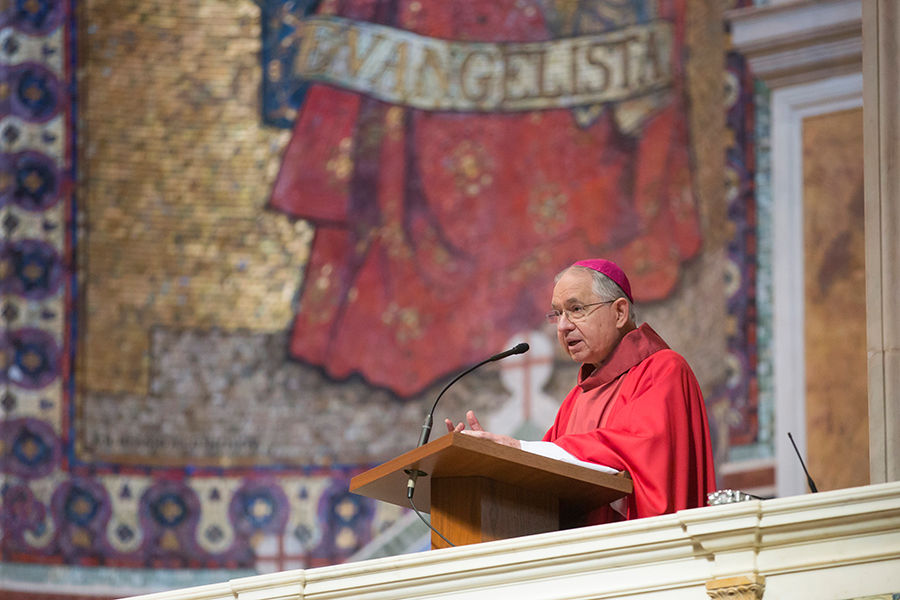Archbishop José H. Gomez celebrated the Red Mass in Washington, D.C., on Oct. 1. The Red Mass is held prior to the beginning of each new term of the U.S. Supreme Court for the high court justices, leaders in national government and for those in the legal profession. The following is adapted from the archbishop’s homily. For his complete homily, click here.
One of the Franciscan missionaries who founded Los Angeles was St. Junípero Serra, our newest American saint. St. Junípero was Hispanic, a migrant from Spain, and he entered this country after living for more than a decade in Mexico.
In his time, there were many in the California colonial government who denied the full humanity of the indigenous peoples living on this land. St. Junípero became their champion. He even wrote a “bill of rights” to protect them. And he wrote this bill of rights three years before America’s Declaration of Independence.
Most Americans do not know this history. But Pope Francis does.
That is why, when the Holy Father came to this country in 2015, his first act was to hold a solemn Mass where he canonized St. Junípero. He held that Mass not in Los Angeles, but right here in the nation’s capital.
Pope Francis was making a point. He believes we should honor St. Junípero as “one of the founding fathers of the United States.”
I agree. Because remembering St. Junípero and the first missionaries reminds us that America’s first beginnings were not political. America’s first beginnings were spiritual.
The missionaries came here first — long before the Pilgrims, long before George Washington and Thomas Jefferson. Long before this country even had a name.
These missionaries — together with the colonists and the statesmen who came later — laid the spiritual and intellectual groundwork for a nation that remains unique in human history. A nation conceived under God and committed to promoting human dignity, freedom and the flourishing of a diversity of peoples, races, ideas and beliefs.
Every life is sacred and every life has a purpose in God’s creation. When God looks at us, he sees beyond the color of our skin, or the countries where we come from, or the language that we speak. God sees only his children — sons and daughters made in his image.
The people who wrote this country’s laws and formed our institutions understood this so well that they called these truths “self-evident.”
America’s founders believed that the only justification for government is to serve the human person — who is created in God’s image, endowed with God-given dignity, rights and responsibilities, and who is called by God to a transcendent destiny. We need to renew our commitment to this vision of a government that serves the human person.
Let us commit ourselves to an America that cares for the young and the elderly, for the poor and the sick; an America where the hungry find bread and the homeless a place to live; an America that welcomes the immigrant and refugee and offers the prisoner a second chance.
Of course, we can always talk about the ways our nation has failed to live up to its founding vision. From the original sins of slavery and the cruel mistreatment of native peoples, to our struggles today with racism and nativism — the American dream is still a work in progress.
We have come a long way, but we have not come nearly far enough. That should not make us give in to cynicism or despair. For all our weakness and failure, America is still a beacon of hope for peoples of every nation, who look to this country for refuge, for freedom and equality under God.
Throughout our history, men and women of faith have always led movements for justice and social change — from the efforts to abolish slavery to the civil rights movement, the farmworkers movement, the peace movement and the right-to-life movement.
This is why religious freedom is so essential to who we are as Americans. We should never silence the voices of believers. They connect us to our founders’ vision. Today more than ever, we need their spirit of peacemaking and searching for nonviolent solutions.
At the heart of the religious vision is the belief in the power of love and forgiveness. And I would like to suggest that forgiveness is part of the unfinished revolution in American society.
Forgiveness does not mean forgetting what has happened or excusing what is wrong; it does not mean ignoring what divides us. True forgiveness sets us free from the cycles of resistance and retaliation; it sets us free to seek reconciliation and healing.
This is what we need in America today — a new spirit of compassion and cooperation, a new sense of our common humanity.
We need to treat “others” as our brothers and our sisters, even those who oppose or disagree with us. The mercy and love that we desire — this is the mercy and love that we must show to our neighbors.
May God bless you all for your service to this great country! And may God bless America!
And may our Blessed Mother Mary help us all to renew the promise of America — to commit ourselves once again to the truths that our founders entrusted to us.

